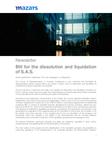
Bill for the dissolution and liquidation of S.A.S.
The House of Representatives is currently considering a very important bill submitted by Representative Héctor Vergara Sierra, by means of which "rules on dissolution and liquidation of simplified joint stock companies" are enacted.
This bill intends to modernize and make more flexible the dissolution and liquidation procedure of S.A.S., making it easier and more agile, thus contributing to promote the dynamism that is necessary in the corporate world, without sacrificing the rights of third parties.
According to the explanatory memorandum of the Project, the current corporate liquidation regime established in the Code of Commerce (and applicable -mostly- to the S.A.S. by virtue of the express remission established in Article 36 of Law 1258 of 2008) is a procedure plagued with formalities that contribute little or nothing to facilitate business development and that, therefore, distort the very essence of the S.A.S., which is the corporate simplification to be able to carry out business ventures. This absence of expeditious liquidation procedures, according to the explanatory memorandum, has generated the congestion of the registries kept by the Chambers of Commerce, the increase in the tax liability (and social security) of the company due to the non liquidation of the company, the transaction costs, the increase in the liability of the administrators and the conflicts between shareholders due to the lack of definition of the liquidation process and the passage of time.
The project introduces significant changes and takes up institutions regulated in other norms, simplifying them and adapting them to the philosophy of the project.
The main pillars of the project are the simplification of the liquidation process, the possibility of continuing operations in the development of its corporate purpose, the differentiation between companies with and without external liabilities, the differentiation between micro-enterprises and other companies, the differentiation between companies in cessation of payments and "private liquidation", the mechanisms of additional adjudication, the possibility (already existing, but cumbersome) of reactivating the company, the possibility of contractually limiting the liability of the liquidators, the limitation of liability of the shareholders, the lack of a term for concluding the liquidation, the public registry of electronic commerce and the mechanism for resolving disputes in this matter. Given the length of the project and the limited space of this column, we will highlight three of the aspects regulated by the norm: the contractual limitation of the liability of the liquidators, the possibility of continuing the corporate operations once the company is dissolved and the corporate reactivation.
The first is a triumph of the private autonomy of the will and the recognition that, unless the rights of third parties are violated, individuals may regulate their private relations in a broad manner. The second is the triumph of reason, since the dissolution of the company necessarily implies being able to continue and conclude the contracts and businesses that have been entered into prior to the entry into such state, unless otherwise decided by a court. The third is the triumph of reasonableness, by perfecting an existing institution since Law 1429/2010 but simplified and devoid of certain requirements and decision-making majorities that hindered its development.


